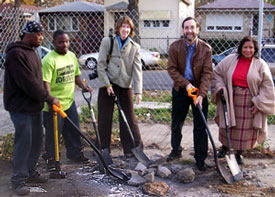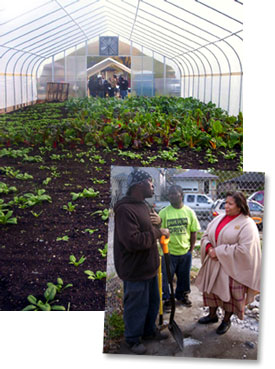FCNNEWSSOURCE

Residents of Chicago’s Englewood neighborhood are seeing something different, produce growing in the city through an urban farming program.
Growing Home, a six-year-old certified organic agricultural business with a social mission of providing transitional employment for homeless and low-income adults, held the groundbreaking Nov. 14 and invited the media and community out to see what progress had been made.
The program not only grows produce like cabbage and tomatoes, but also offers difficult-to-employ people, most of whom have criminal backgrounds, a second chance. They learn urban farming techniques and other skills, such as marketing and customer service.
Growing Home’s new urban farm is a part of the larger Quality of Life Plan for the Englewood community, which calls for developing an Urban Agriculture District in Englewood that will lead to healthy and sustainable living among Englewood residents. Growing Home is a partner with Teamwork Englewood, a community planning and development non-profit, which led and crafted the Quality of Life plan.

The groundbreaking ceremony was for a greenhouse and multi-purpose building that will serve as the center of Growing Home’s efforts. Future plans include operating a farmers market and organic vegetable carts in the neighborhood, which has little access to fresh food and produce. A study described Englewood as one of the city’s communities that exists in a “food desert,” when it comes to healthy food.
Alderman Toni Foulkes joined Growing Home executive director Harry Rhodes and staff from the group for a symbolic turnover of some soil under broken concrete. Tyra Rodgers, assistant farm manager for the site, said the program offers an opportunity to help rebuild a community he helped tear down.
People who want a second chance need opportunities like this to contribute to society and support their determination to stay out of the criminal justice system, he said.
Growing Home also operates a 10-acre farm 75 miles southwest of Chicago at Marseilles, Ill. and a half-acre urban farm on the south side.
In 2007, Growing Home harvested 50 crops (130 varieties) and four animal products–honey, worms, worm castings, and eggs and had sales of over $70,000. Growing Home’s current customers include some of Chicago’s most well-known restaurants: Bistro Campagne, Lula Café, Blackbird, First Slice Café, Green Zebra, North Pond, Soundings, and Vie.
The U.S. organic sector is expected to grow from $13 billion in 2003 to over $25 billion in 2007. However, less than three percent of organic produce available in Chicago is grown locally.












